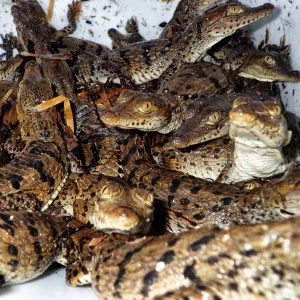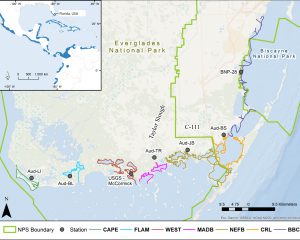- In Florida, the threatened American Crocodile plays an important role in the waterways and environment that we live in and enjoy.
- Among their attributes, their health, breeding and survival status tell us a lot about the current state of the Florida Everglades as well.
- How the American Crocodile fares in the evolving conditions of these waterways conveys several important messages — one being whether water restoration efforts are achieving the goals originally set decades ago, according to scientists at the University of Florida Institute of Food and Agricultural Sciences (UF/IFAS).

DAVIE, Fla. — A study led by UF/IFAS scientists that focused on the threatened American Crocodile maps out the status of their population over the last 40 years in response to changes in the Florida Everglades. Key findings demonstrate that increased salinity in the water that crocodiles navigate influences their health, breeding behavior and ultimately, survival.
Considered a key wildlife indicator, the health of the American Crocodile will continue to tell us whether water restoration efforts that began in the late 1980s are benefitting crocodiles. Those restoration efforts began as part of a $14.8 billion Comprehensive Everglades Restoration Project to bring back more natural conditions in the Florida Everglades.
“Crocodiles may look burly and resilient, and we think of them as ancient dinosaurs, but they are vulnerable to changes in the environment, including human-caused changes to their natural ecosystem,” said Venetia Briggs-Gonzalez, a research biologist who works at the Croc Docs Laboratory at the UF/IFAS Fort Lauderdale Research and Education Center.
Briggs-Gonzalez is the lead author of American Crocodiles as restoration bioindicators in the Florida Everglades, a study published in PLOS ONE on May 19. The study relies on nearly 40 years of capture data and sheds light on how rising salinity levels in Florida Bay over time influences the population health of American Crocodiles.
“As designated bio-indicator species telling us how restoration efforts in the Everglades are performing, our results show that hypersaline conditions in the waterways they live, breed and navigate negatively affect how a crocodile is doing in its environment. Where a crocodile is captured matters to its overall body condition, how fast it can grow, and ultimately to its survival,” said Briggs-Gonzalez.
For the study, UF/IFAS scientists conducted a long-term capture-recapture assessment on the South Florida population of American Crocodiles from 1978 to 2015. Through the study, researchers estimated the species’ annual survival and evaluated efforts to restore more historic hydrologic conditions in South Florida.
 Scientists studied an area spanning 341 miles, from Biscayne Bay west to Cape Sable. The study area included Northeast Florida Bay, Crocodile Lake National Wildlife Refuge and Flamingo area in the Everglades National Park.
Scientists studied an area spanning 341 miles, from Biscayne Bay west to Cape Sable. The study area included Northeast Florida Bay, Crocodile Lake National Wildlife Refuge and Flamingo area in the Everglades National Park.
Scientists conducted 10,040 crocodile capture-and-release events. More than 90 percent of what they captured were hatchlings. To evaluate the status of American crocodiles in Florida, they measured growth, survival and body condition. The study used recorded salinity levels from nearby monitoring stations where crocodiles were in their natural habitats whether in freshwater estuaries, brackish waterways or in sea water along the coastal shoreline.
“Overall, there is a good sign of improvement, and they are doing better here than in other parts of the world in their range,” said Briggs-Gonzalez. “However, with increased freshwater flow and lower salinity, we expect to see further improvement in crocodile growth, body condition and survival.”
Among the study’s critical findings is how American Crocodiles in South Florida showed signs of shifting their traditional nesting locations to avoid areas of high salinity. Scientists found there were areas of high salinity mostly concentrated in Northeast Florida Bay, where water has been diverted to accommodate development.
“Historically, crocodile nesting occurred in Crocodile Lake National Wildlife Refuge and in Northeast Florida Bay within Everglades National Park with no known nesting in Cape Sable or Flamingo area until a canal was plugged in 1986 and the first nest was discovered the following morning,” said Gonzalez-Briggs.
Since then, the majority of nesting in Everglades National Park has moved to Cape Sable and Flamingo areas. The study reports that nests in Northeast Florida Bay are increasing at a slower rate.
“High salinity is not good for wildlife, especially those that require freshwater,” said Briggs-Gonzalez. “Now they have to endure salty water and crocodile babies need fresh water to survive. High salinity threatens a crocodile’s growth and body condition too. It is a cascading effect that has an impact on all aspects of their lives.”
Survival and growth of a crocodile are long-term measures, whereas body condition is a short-term measure. With continued monitoring by the Croc Docs, refreshed data will illustrate crocodile progress in the Everglades.
“Crocodiles show us that fresh water does matter,” said Briggs-Gonzalez. “How much and when matters because it affects their survival. It’s not just whether they are going to live or die, but how healthy will they be over their lifetime. By getting the water right in the Everglades, everything else will fall into place.”

-30-
By Lourdes Mederos, rodriguezl@ufl.edu
The mission of the University of Florida Institute of Food and Agricultural Sciences (UF/IFAS) is to develop knowledge relevant to agricultural, human and natural resources and to make that knowledge available to sustain and enhance the quality of human life. With more than a dozen research facilities, 67 county Extension offices, and award-winning students and faculty in the UF College of Agricultural and Life Sciences, UF/IFAS brings science-based solutions to the state’s agricultural and natural resources industries, and all Florida residents.
ifas.ufl.edu | @UF_IFAS
 1
1
